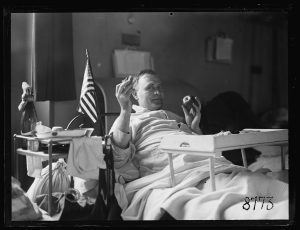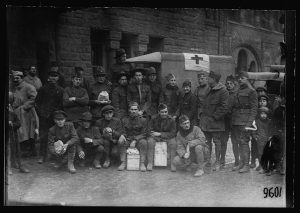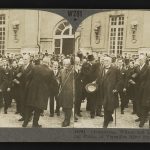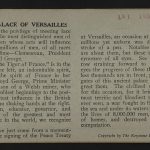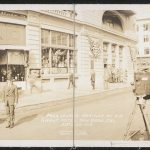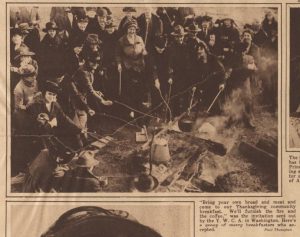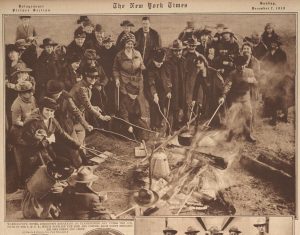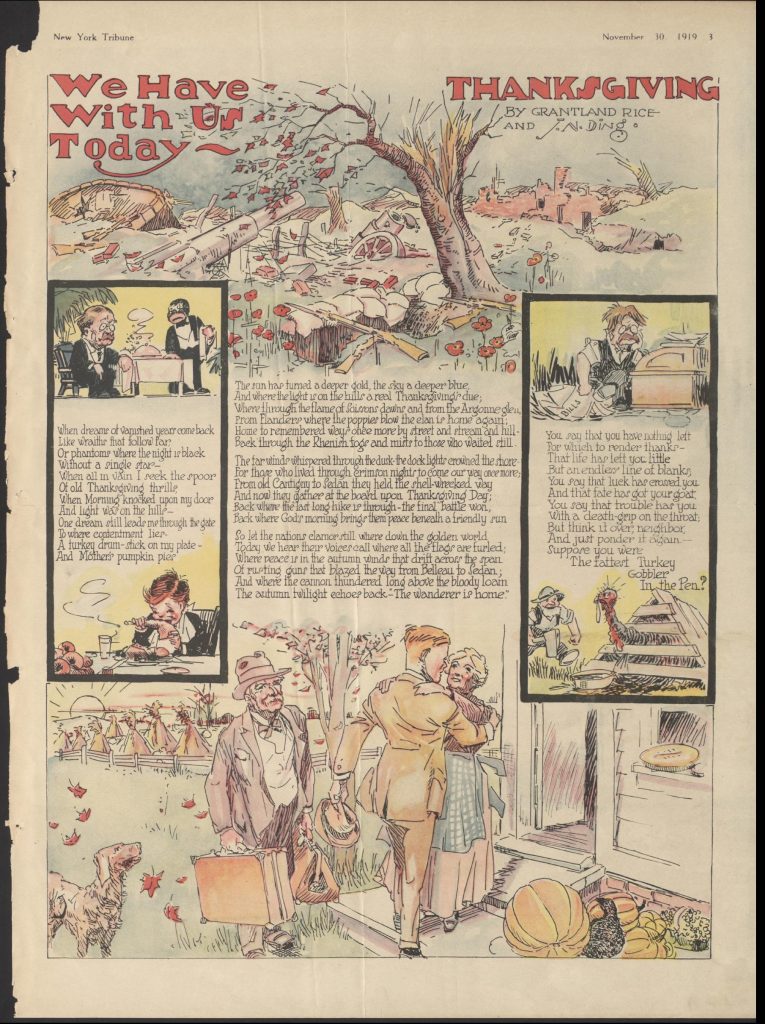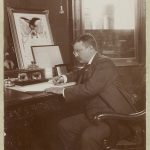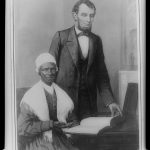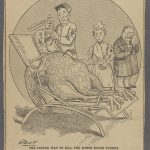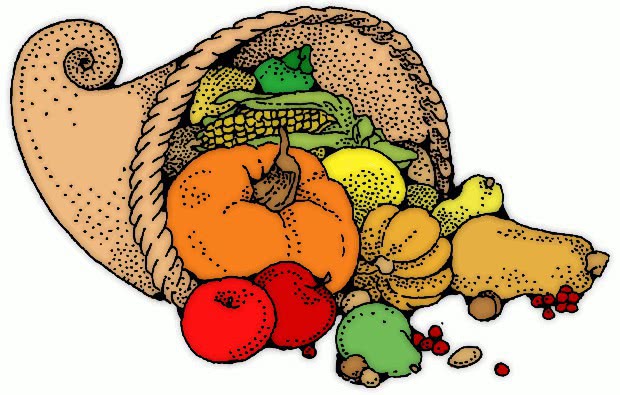On the day after Thanksgiving in 1869 The New-York Times devoted its entire front page to how the holiday had been observed the day before. This included over four columns (and counting) devoted to the services and sermons at various religious institutions in the metro area. Fifty years later the Times front pages on Thanksgiving and the day after didn’t even mention the holiday. The focus seemed to be on the coal strike, communists, and a huge meteor that plunged into Lake Michigan on Thanksgiving Day night.
However, like Ulysses S. Grant in 1869, President Woodrow Wilson had proclaimed a national day of thanksgiving and prayer to God. Besides being (unsurprisingly?[1] longer than Grant’s, President Wilson’s proclamation was much more involved with the world. While both presidents were thankful for abundant harvests, Mr. Wilson saw the harvest as good for the whole world: “Our harvests have been plentiful, and of our abundance we have been able to render succor to less favored nations.” Americans had a duty to mankind to ensure that the war victory was complete: “we should strive to aid by our example and by our cooperation in realizing the enduring welfare of all peoples and in bringing into being a world ruled by friendship and good will.”
From Pilgrim Hall Museum
THANKSGIVING DAY – 1919 BY THE PRESIDENT OF THE UNITED STATES OF AMERICA – A PROCLAMATION
The season of the year has again arrived when the people of the United States are accustomed to unite in giving thanks to Almighty God for the blessings which He has conferred upon our country during the twelve months that have passed. A year ago our people poured out their hearts in praise and thanksgiving that through divine aid the right was victorious and peace had come to the nations which had so courageously struggled in defense of human liberty and justice. Now that the stern task is ended and the fruits of achievement are ours, we look forward with confidence to the dawn on an era where the sacrifices of the nations will find recompense in a world at peace. But to attain the consummation of the great work to which the American people devoted their manhood and the vast resources of their country they should, as they give thanks to God, reconsecrate themselves to those principles of right which triumphed through His merciful goodness. Our gratitude can find no more perfect expression than to bulwark with loyalty and patriotism those principles for which the free peoples of the earth fought and died. During the past year we have had much to make us grateful. In spite of the confusion in our economic life resulting from the war we have prospered. Our harvests have been plentiful, and of our abundance we have been able to render succor to less favored nations. Our democracy remains unshaken in a world torn with political and social unrest. Our traditional ideals are still our guides in the path of progress and civilization.
These great blessings, vouchsafed to us, for which we devoutly give thanks, should arouse us to a fuller sense of our duty to ourselves and to mankind to see to it that nothing that we may do shall mar the completeness of the victory which we helped to win. No selfish purpose animated us in becoming participants in the world war, and with a like spirit of unselfishness we should strive to aid by our example and by our cooperation in realizing the enduring welfare of all peoples and in bringing into being a world ruled by friendship and good will.
Wherefore, I, Woodrow Wilson, President of the United States of America, hereby designate Thursday, the twenty-seventh day of November next, for observance as a day of thanksgiving and prayer by my fellow-countrymen, inviting them to cease on that day from their ordinary tasks and to unite in their homes and in their several places of worship in ascribing praise and thanksgiving to God the Author of all blessings and the Master of our destinies.
In witness whereof I have hereunto set my hand and caused the seal of the United States to be affixed.
Done in the District of Columbia this 5th day of November in the year of our Lord, one thousand nine hundred and nineteen, and of the independence of the United States the one hundred and forty-fourth.
____________________
When the proclamation was issued on November 5th the United States Senate was debating whether to ratify the peace treaty that ended World War I and established the League of Nations; the Senate voted against the treaty three times on November 19th. Although Senate Republicans favored accepting the treaty with reservations, President Wilson “rejected this compromise and enough Democrats followed his lead to defeat ratification.”
And at the time Mr. Wilson was “seriously indisposed” because of a stroke he suffered on October 2nd. It had been quite a year for the president. For his work helping to hammer out the Paris treaty “Wilson was awarded the 1919 Nobel Peace Prize.” Back in the States he barnstormed the country trying to drum up support for the treaty and the League of Nations. Then the stroke. “Throughout late 1919, Wilson’s inner circle concealed the severity of his health issues.”
The New York City picture newspapers didn’t have a lot of Thanksgiving coverage either. Both papers showed a unique celebration in the nation’s capital, and the Tribune featured the traditional joy and gratitude of soldiers (and sailors) returning home. Most American military units returned from Europe in 1919.
This is another one of those posts I find mysterious because of all I don’t know. President Wilson was “seriously indisposed” after his October 2nd stroke. Was he in good enough shape to compose the November 5th Thanksgiving proclamation? The words certainly seem to reflect Mr. Wilson’s view that the United States should be more involved in world affairs. You can also see the Thanksgiving proclamations at The American Presidency Project. The only Wilson Thanksgiving proclamation that is signed
“WOODROW WILSON
By the President:
ROBERT LANSING,
Secretary of State.”
is the 1919 one. The others are just signed by Mr. Wilson.
I almost had to get out a magnifying glass to find a blue-gray connection for this post. The picture of Theodore Roosevelt signing the 1902 Thanksgiving proclamation is definitely out there. It seems that there is an image of Sojourner Truth with Abraham Lincoln against the wall. Apparently this commemorates the October 1864 visit of Sojourner Truth to the White House. TR’s picture is a little different than the one at the Library of Congress. I can’t figure out who the man under the eagle in the other picture is. Over 100 years later the cartoon of the humane Theodore Roosevelt sort of reminded me of his “speak softly and carry a big stick” policy – he was pictured as caring about the turkey’s welfare but he went big game hunting in Africa in 1909. You can read the history of the presidential turkey pardons at The White House Historical Association. And then, happy coincidence, I just found the photo of President Wilson arriving at San Diego’s U.S. Grant Hotel. The president’s arrival was about two weeks before his stroke.
According to the National Archives, the U.S. State Department tried to encourage allied nations to celebrate Thanksgiving Day 1918 in the aftermath of the November 11th Armistice.
[November 29, 2019]I moved a sentence, made a change, added the reference to the 1868 Republican Chart, and added the following image links. From the Library of Congress: Thanksgiving Day 1918 hospital and prison at Metz; the big three allied leaders leaving Versailles; at the Grant Hotel; the New York Tribune – November 30, 1919 (the Grantland Rice’s poem illustrated by Ding Darling) and December 7, 1919; more cookout coverage at The New York Times for December 7th; T.R. signing; Truth and Lincoln viewing; turkey’s humane end. The Cornucopia comes from WPClipart.
- [1]The Republican Chart for the 1868 presidential race included the nomination acceptance letters. Veep Schuyler Colfax’s letter was much longer than that of the general at the top of the ticket↩

